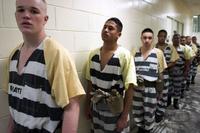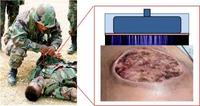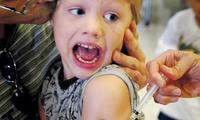-
New repellant frightens mosquitoes to death
Anopheles gambiae mosquitoes carry and spread diseases, including malaria, the second most deadly transmitted disease in Africa; mosquitoes zero in on their next meal – human blood — using their keen sense of smell; a new repellent would bombard the mosquitoes with so many strong odors, it would scare them away from human odors
-
-
U.S. drug shortages a threat to public health, patient care
Shortages in the United States of key drugs used to fight infections represent a public health emergency and can put patients at risk; frequent anti-infective shortages can substantially alter clinical care and may lead to worse outcomes for patients
-
-
New disease tracking system for London Olympics
To help track and control the spread of infectious diseases at the London Olympic Games, Canadian researchers are teaming up with British authorities to develop a new system capable of tracking diseases at both the global and local level
-
-
Half of U.S. jails not in national vaccination campaign

A new study by the Centers for Disease Control and Prevention (CDC) found that more than half of U.S. jails are not included in the national flu vaccine campaign, despite the fact that jail and prison inmates are at increased risk of catching infectious diseases
-
-
Scientists urge more study of use of antimicrobial in food animals
The FDA the other day banned the use of some antibiotics in food animals in order to preserve the effectiveness of these antibiotics in humans; the EU is set to follow suit; scientists argue, however, that the use of antibiotics in the animal populations is unlikely to be the major source of drug resistance in humans, and question policies that restrict the use of antimicrobials in animals
-
-
Thousands of deadly bracelets made from toxic plant recalled

An urgent recall is underway after it was discovered that a bracelet sold in the United Kingdom was actually made from a highly toxic seed; the red and black bracelets were made with the Jequirity bean, the deadly seed from the abrus precatorious plant, which contains the toxin abrin
-
-
Georgia readies portable hospitals
On Monday local health and emergency response officials from Georgia’s West Central Health District gathered to learn how to quickly set up a portable hospital in the event of an emergency
-
-
Thai health officials prevent outbreaks in historic floods
Thanks to Thailand’s aggressive public health and emergency response operations, the country managed successfully to prevent disease outbreaks following record floods
-
-
Key to disaster preparedness is “training, training, training”

Bonnie S. Michelman, CPP/CHPA, the director of police, security, and outside services at Massachusetts General Hospital, recently took the time to speak with Homeland Security NewsWire’s executive editor Eugene K. Chow; in their interview, Michelman highlights the recent technological security measures Massachusetts General has installed, finding the right balance between security and openness, and preventing terrorists from stealing the low-grade radioactive materials that are housed in hospitals
-
-
Study promises possible therapy for radiation sickness
Studies of potential radiation therapies suggest they would be effective in humans only if administered within a few minutes or hours of radiation exposure, thus making them impractical for use in response to events involving mass casualties; the larger time window for administering a new 2-drug regimen ofeers the prospect that it could become a mainstay of the response to public health threats such as a nuclear power plant accident or nuclear terror attack
-
-
Ionized plasmas as cheap sterilizer in tough places

Scientists show that ionized plasmas like those in neon lights and plasma TVs not only can sterilize water, but make it antimicrobial; these plasma devices could be life-savers in developing countries, disaster areas, or on the battlefield where sterile water for medical use is in short supply and expensive to produce
-
-
Jefferson County tests flu pandemic vaccination capabilities
Local public health authorities in Jefferson County, New York are currently testing their ability to administer large quantities of flu vaccines in the event of a pandemic by offering to inoculate its residents for free
-
-
Mysterious incident leaves more than 20 high-schoolers sick
Public health authorities in Texas are investigating a mysterious incident that left more than twenty people sick during a high school football game in Houston last Friday; the stadium was immediately evacuated and a Hazmat team dispatched, while a total of twenty-two students were taken to several local hospitals for treatment
-
-
11,000 California parents refuse basic vaccinations for their children

Even with the massive whooping cough outbreak last year in California that sickened more than 9,100 people and killed ten babies, over 11,000 hesitant parents chose not to vaccinate their children against the infectious disease; with record numbers of children going unvaccinated, there have been an increasing number of outbreaks of highly infectious diseases like measles and whooping cough
-
-
Millions of yet-to-be-described viruses found in raw sewage

There are roughly 1.8 million species of organisms on planet Earth, and each one is host to untold numbers of unique viruses, but only about 3,000 have been identified to date; a new study reveals a vast world of unseen viral diversity that exists right under our nose — in ordinary raw sewage, to be precise
-
More headlines
The long view
We Ran the C.D.C.: Kennedy Is Endangering Every American’s Health
Nine former leaders of the Centers for Disease Control and Prevention (CDC), who served as directors or acting directors under Republican and Democratic administrations, serving under presidents from Jimmy Carter to Donald Trrump, argue that HHS Secretary Roert F. Kennedy Jr. poses a clear and present danger to the health of Americans. He has placed anti-vaxxers and conspiracy theorists at top HHS positions, and he appears to be guided by a hostility to science and a belief in bizarre, unscientific approaches to public health.
